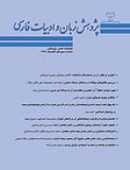تحليل تقابل سنت و مدرنیته در رمان اجتماعی پس از انقلاب اسلامی
محورهای موضوعی : Research in Iranian classical literature
1 - دانشیار پژوهشگاه علوم انسانی و مطالعات فرهنگی
کلید واژه: رمان اجتماعی سنت مدرنیته مهاجرت مؤلفههای ظاهری مدرنیته مؤلفههای فرهنگی مدرنیته,
چکیده مقاله :
رمان اجتماعی، عرصهای مناسب برای بازنمایی و بازآفرینی واقعیت اجتماعی در آیینۀ ادبیات است. چالش میان سنت و مدرنیته از مضامینی است که از دورة مشروطه در ادبیات فارسی بازتاب یافته و در هر دوره به شکلی متناسب با تحولات اجتماعی آن دوره بازنمایی شده است. پس از انقلاب اسلامی، رمان اجتماعی رشد کمی و کیفی قابل توجهی پیدا کرد و کمتر رمانی در این دوره وجود دارد که مضامین اجتماعی در آن طرح نشده باشد. مسئلۀ اصلی این پژوهش، بررسی تقابل مفاهیم سنت و مدرنیسم در رمانهای اجتماعی پس از انقلاب اسلامی است. هدف از پژوهش، بررسی و مقایسۀ تطبیقی رویکرد نویسندگان به این موضوع، در دهۀ شصت، هفتاد و هشتاد شمسی است. این پژوهش به روش توصیفی- تحلیلی و با استفاده از منابع کتابخانهای انجام شده است. نتیجۀ پژوهش نشان میدهد که در رمانهای دهۀ شصت این تقابل به شکلی آشکار و بارز، بهویژه در اعتراض به صنعتی شدن، مظاهر مادی مدرنیته و از دست رفتن سنتها دیده میشود، اما در دهة هفتاد و هشتاد، این تجربه درونی شده و به شکل تردید، سرگردانی و گاه سنتگرایی بروز یافته است. در عین حال، پذیرش تحولاتی که در دهة شصت، یک چالش محسوب میشد، در دهة هفتاد و هشتاد، نشان دهندة حرکت روبهرشد مدرنیته بهخصوص در جامعة شهری و طبقة تحصیلکرده است.
Social Novel is an applicatory area to reflect and recreate social realities in the mirror of literature. The challenge between tradition and modernity is one the themes that is reflected in the Persian literature from the constitutional monarchy and is reflected in an appropriate manner with social changes of every era. After the Islamic Revolution of Iran, social novel experienced considerable quantitative and qualitative growth and there is few novels which in this time which has not expressed social themes. The main problem of this study is reviewing the conflict of tradition and modernity concepts in social novels after the Islamic Revolution. The purpose of this study is comparative reviewing and comparing of the authors’ approach toward this issue in the three decades from 1360 to 1390 (1981 to 2011). This study is done applying descriptive-analytic method and using library resources. The result of this research shows that in Novels of 1360 to 1370 (1981 to 1991) this conflict is reflected in a clear and manifest manner particularly in objection to industrialization, the material looks of modernity and losing traditions, but in 1370 to 1390 (1991 to 2011) this experience is internalized and is manifested in form of suspicion, wandering, and traditionalism. However, the acceptance of changes of first decade which were regarded as serious challenges in second and third decade shows the flourishing movement toward modernity particularly in city communities and educated group.

